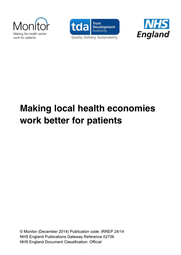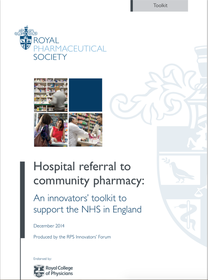NEWS - DECEMBER 2014

MAKING LOCAL HEALTH ECONOMIES WORK BETTER FOR PATIENTS
24 pages
The tripartite partners − NHS England, Monitor and the TDA − came together earlier this year to undertake an exercise to identify the most challenged local health economies (LHEs). These were the areas whose healthcare organisations were in most need of intensive support in order to develop robust strategic plans that were both clinically and financially sustainable over the next five years.
We agreed to jointly fund some additional help for the 11 areas we had chosen in developing their five-year strategies.
24 pages
The tripartite partners − NHS England, Monitor and the TDA − came together earlier this year to undertake an exercise to identify the most challenged local health economies (LHEs). These were the areas whose healthcare organisations were in most need of intensive support in order to develop robust strategic plans that were both clinically and financially sustainable over the next five years.
We agreed to jointly fund some additional help for the 11 areas we had chosen in developing their five-year strategies.
BETTER CARE FUND - HOW IT WORKS ...
13 pages
1.1. The Better Care Fund was announced in June 2013 to drive the transformation of local services to ensure that people receive better and more integrated care and support. The fund will consist of at least £3.8 billion to be deployed locally on health and social care through pooled budget arrangements between local authorities and Clinical Commissioning Groups.
1.2. This document sets out the detailed policy framework for the implementation of the fund, as agreed across the Department of Health, Department for Communities and Local Government, the Local Government Association and NHS England.
1.3. It is not intended to act as further guidance to local areas on implementation of the fund. NHS England, working with the partners above and the Local Government Association, developed and issued detailed guidance on developing Better Care Fund plans in July 2014. Local areas should continue to refer to and follow this guidance.
13 pages
1.1. The Better Care Fund was announced in June 2013 to drive the transformation of local services to ensure that people receive better and more integrated care and support. The fund will consist of at least £3.8 billion to be deployed locally on health and social care through pooled budget arrangements between local authorities and Clinical Commissioning Groups.
1.2. This document sets out the detailed policy framework for the implementation of the fund, as agreed across the Department of Health, Department for Communities and Local Government, the Local Government Association and NHS England.
1.3. It is not intended to act as further guidance to local areas on implementation of the fund. NHS England, working with the partners above and the Local Government Association, developed and issued detailed guidance on developing Better Care Fund plans in July 2014. Local areas should continue to refer to and follow this guidance.
CCGs FUNDING ALLOCATIONS
7 pages
NHS England has published the funding allocations that Clinical Commissioning Groups will
receive over the next two years (2014/15 and 2015/16).
Clinical Commissioning Group allocations 2014/15 and 2015/16
Following the NHS England Board meeting on 17th December and the decisions regarding allocation policy, table 1 sets out the programme cost allocation for each Clinical Commissioning Group (CCG) for 2014/15 and 2015/16.
The tables show the 2013/14 baseline, based on CCGs' reported position at month six, alongside the 2014/15 and 2015/16 allocations, in cash terms and year‐on‐year growth percentage terms.
For 2015/16 CCGs will also receive an additional allocation to provide part of their contribution to the Better Care Fund. This reflects monies that in 2014/15 will be passed directly from NHS England to Local Authorities to support integration of health and social care. This is shown in the column titled Better Care Fund Additional Allocation and totals £1.1bn.
The total contribution of revenue funds (£3.4bn) to the Better Care Fund by CCG is shown in the final column.
In the coming days we will publish more information about CCG allocations, including target allocation, population estimates and the resulting allocations per head. A full technical package, including the calculation of the target allocations and running cost allocations will be published in the New Year.
Please contact [email protected] if you have a query regarding the information contained in the table.
7 pages
NHS England has published the funding allocations that Clinical Commissioning Groups will
receive over the next two years (2014/15 and 2015/16).
Clinical Commissioning Group allocations 2014/15 and 2015/16
Following the NHS England Board meeting on 17th December and the decisions regarding allocation policy, table 1 sets out the programme cost allocation for each Clinical Commissioning Group (CCG) for 2014/15 and 2015/16.
The tables show the 2013/14 baseline, based on CCGs' reported position at month six, alongside the 2014/15 and 2015/16 allocations, in cash terms and year‐on‐year growth percentage terms.
For 2015/16 CCGs will also receive an additional allocation to provide part of their contribution to the Better Care Fund. This reflects monies that in 2014/15 will be passed directly from NHS England to Local Authorities to support integration of health and social care. This is shown in the column titled Better Care Fund Additional Allocation and totals £1.1bn.
The total contribution of revenue funds (£3.4bn) to the Better Care Fund by CCG is shown in the final column.
In the coming days we will publish more information about CCG allocations, including target allocation, population estimates and the resulting allocations per head. A full technical package, including the calculation of the target allocations and running cost allocations will be published in the New Year.
Please contact [email protected] if you have a query regarding the information contained in the table.
HEALTH COMMITTEE: ACCOUNTABILITY HEARING - GMC - 06 JANUARY 2015
Oral Evidence Session
On Tuesday 6 January the Health Committee holds its 2015 Accountability hearing with the General Medical Council.
• Health Committee
• 2015 Accountability hearing with the General Medical Council
Oral Evidence Session
On Tuesday 6 January the Health Committee holds its 2015 Accountability hearing with the General Medical Council.
• Health Committee
• 2015 Accountability hearing with the General Medical Council
NHS ENGLAND TO TRIAL EMPLOYING PHARMACISTS IN A&E
The urgent and emergency care review being led by NHS England will conduct a national pilot in the spring to trial employing pharmacists in an emergency department setting.
The urgent and emergency care review being led by NHS England will conduct a national pilot in the spring to trial employing pharmacists in an emergency department setting.
|
PPI IN MENTAL HEALTH WORK
8 pages This framework aims to help create meaningful involvement with service users and carers. Developed within a mental health context, these standards are universally relevant to involvement and co-production in all areas of health and social care |
|
HOSPITAL DISCHARGE - REFER TO PHARMACY
21 pages The Royal Pharmaceutical Society (RPS) is work to ensure that community pharmacists have the information that they need about medicines, when patients are discharged from hospital. |
GP PRACTICES OPT TO LIMIT SERVICES TO CONTROL WORKLOAD
A total of 68% of 377 GP partners and Practice Managers across the UK said they were opting out of services. GPC Deputy Chairman, Dr Richard Vautrey, said financial pressure had left Practices ‘increasingly looking at their bottom line’. Many had decided that some services were not cost-effective or clinically beneficial enough to justify the workload involved, he said.
A significant number of respondents cited the controversial Dementia DES as a service their Practice had opted out of providing. The DES offers Practices £55 per additional Dementia diagnosis, but has been condemned as ‘unethical’ by many GPs. But a wide range of services were among those Practices can no longer sustain.
Some respondents said they had opted out of the learning disabilities DES, could no longer provide support for nursing homes, or had stopped minor surgery. Others said they had reduced extended hours provision, public health services or had dropped enhanced services intended to limit hospital admissions.
A partner from Lancashire said that taking on new services was not an option. 'Even if the financial benefit was worth it, we do not have the capacity to take on more work. We are struggling just to get through each day and some other Practices said they felt compelled by financial pressure to deliver all possible services.' 'We are over a barrel and can't afford to lose more income,' wrote one partner.
A total of 68% of 377 GP partners and Practice Managers across the UK said they were opting out of services. GPC Deputy Chairman, Dr Richard Vautrey, said financial pressure had left Practices ‘increasingly looking at their bottom line’. Many had decided that some services were not cost-effective or clinically beneficial enough to justify the workload involved, he said.
A significant number of respondents cited the controversial Dementia DES as a service their Practice had opted out of providing. The DES offers Practices £55 per additional Dementia diagnosis, but has been condemned as ‘unethical’ by many GPs. But a wide range of services were among those Practices can no longer sustain.
Some respondents said they had opted out of the learning disabilities DES, could no longer provide support for nursing homes, or had stopped minor surgery. Others said they had reduced extended hours provision, public health services or had dropped enhanced services intended to limit hospital admissions.
A partner from Lancashire said that taking on new services was not an option. 'Even if the financial benefit was worth it, we do not have the capacity to take on more work. We are struggling just to get through each day and some other Practices said they felt compelled by financial pressure to deliver all possible services.' 'We are over a barrel and can't afford to lose more income,' wrote one partner.
MEDICAL INNOVATION BILL
The list of bodies opposed to the Medical Innovation Bill is very long—the Academy for Healthcare Science, the Academy of Medical Royal Colleges, the Academy of Medical Sciences, the Medical Research Council, the Wellcome Trust, Action Against Medical Accidents, the Association of Medical Research Charities, the Association of Personal Injury Lawyers, the British Medical Association, the British Pharmacological Society, Cancer Research UK, the Good Thinking Society, Healthwatch, the Medical Protection Society, the Medical Defence Union, the Motor Neurone Disease Association, the National Institute for Health and Care Excellence, the NHS Health Research Authority and the NHS Litigation Authority.
The list of bodies opposed to the Medical Innovation Bill is very long—the Academy for Healthcare Science, the Academy of Medical Royal Colleges, the Academy of Medical Sciences, the Medical Research Council, the Wellcome Trust, Action Against Medical Accidents, the Association of Medical Research Charities, the Association of Personal Injury Lawyers, the British Medical Association, the British Pharmacological Society, Cancer Research UK, the Good Thinking Society, Healthwatch, the Medical Protection Society, the Medical Defence Union, the Motor Neurone Disease Association, the National Institute for Health and Care Excellence, the NHS Health Research Authority and the NHS Litigation Authority.
RIGHTS OF PEOPLE TO INFLUENCE LOCAL DECISIONS IN HEALTHCARE
Correspondence to raise the position of the Monitor in relation to the rights of communities in influencing and determining the configuration of health services provided in their areas.
Correspondence to raise the position of the Monitor in relation to the rights of communities in influencing and determining the configuration of health services provided in their areas.
CQC TO INSPECT GP PRACTICES IN THE FOLLOWING CCG GROUPS in JANUARY, FEBRUARY and MARCH 2015
If you live in one of these areas being inspected, the CQC says: 'Let us know about your experiences using your GP Practice. Good or bad, your feedback will help our inspection teams focus their work.' Speak up and tell us on 0300 61 61 61 or email: [email protected]
If you live in one of these areas being inspected, the CQC says: 'Let us know about your experiences using your GP Practice. Good or bad, your feedback will help our inspection teams focus their work.' Speak up and tell us on 0300 61 61 61 or email: [email protected]
|
|
|
GP PRACTICES TO WORK WITH JOB CENTRES, FOLLOWING £1bn INVESTMENT
01 December 2014
GP Practices will be expected to work closely with job centres, social services and other community services in return for the £1bn funding promised to primary care, the health secretary announced today.
Addressing the House of Commons, Jeremy Hunt confirmed that £1bn was to be invested in ‘community and primary care facilities’ over the next four years as part of the Autumn Statement, while £200m was to be used to fund pilots of the new ‘Multispecialty Community Providers (MSPs)’ outlined in NHS England’s Five Year Forward View, which will see GPs employing community service providers as well as hospital consultants.
That money, which is being sourced from £1.1 billion worth of fines slapped on misbehaving banks, will be accompanied by £1.7 billion extra investment from the Treasury into ‘front line services’, said the Health Secretary.
Mr Hunt also announced that CCGs will soon be able to commission public health services as part of the ‘co-commissioning’ drive. Chancellor George Osborne yesterday announced on the BBC that the Government was to invest in NHS services, and trailled that GP surgeries were to receive £250m a year over the next four years.
The Health Secretary confirmed this funding in Parliament, and said that new ‘primary care facilities’ would be expected to join with other, non-health, services such as job centres, although provided little more detail about how this would work. He said: ‘To deliver world-class community care we need much better physical infrastructure. So today I can announce a £1bn investment fund in community and primary care facilities over the next four years. This will pay for new surgeries and community care facilities in the places where people most want them, near their own homes and families. These new primary care facilities will also be encouraged to join up closely with local job centres, social services and other community services’.
01 December 2014
GP Practices will be expected to work closely with job centres, social services and other community services in return for the £1bn funding promised to primary care, the health secretary announced today.
Addressing the House of Commons, Jeremy Hunt confirmed that £1bn was to be invested in ‘community and primary care facilities’ over the next four years as part of the Autumn Statement, while £200m was to be used to fund pilots of the new ‘Multispecialty Community Providers (MSPs)’ outlined in NHS England’s Five Year Forward View, which will see GPs employing community service providers as well as hospital consultants.
That money, which is being sourced from £1.1 billion worth of fines slapped on misbehaving banks, will be accompanied by £1.7 billion extra investment from the Treasury into ‘front line services’, said the Health Secretary.
Mr Hunt also announced that CCGs will soon be able to commission public health services as part of the ‘co-commissioning’ drive. Chancellor George Osborne yesterday announced on the BBC that the Government was to invest in NHS services, and trailled that GP surgeries were to receive £250m a year over the next four years.
The Health Secretary confirmed this funding in Parliament, and said that new ‘primary care facilities’ would be expected to join with other, non-health, services such as job centres, although provided little more detail about how this would work. He said: ‘To deliver world-class community care we need much better physical infrastructure. So today I can announce a £1bn investment fund in community and primary care facilities over the next four years. This will pay for new surgeries and community care facilities in the places where people most want them, near their own homes and families. These new primary care facilities will also be encouraged to join up closely with local job centres, social services and other community services’.



